Critique Comment: Observational Studies and Vandenbroucke Paper
VerifiedAdded on 2020/05/16
|5
|973
|58
Homework Assignment
AI Summary
This assignment is a critique of a paper by Vandenbroucke, focusing on the use of observational studies in healthcare research. The student provides their own comments and analysis on various points made in the paper. The critique covers several key areas, including the use of observational studies for evaluating adverse drug reactions, the role of prescribers' knowledge of patient risks, the application of routine databases in health research, and the challenges of studying lifestyle effects observationally. The student disagrees with some of Vandenbroucke's arguments, offering alternative perspectives and emphasizing the value of high-quality observational studies in comparative effectiveness research. The critique also highlights the importance of analytic rigor and understanding the limitations of observational methods in drawing conclusions about health and well-being.
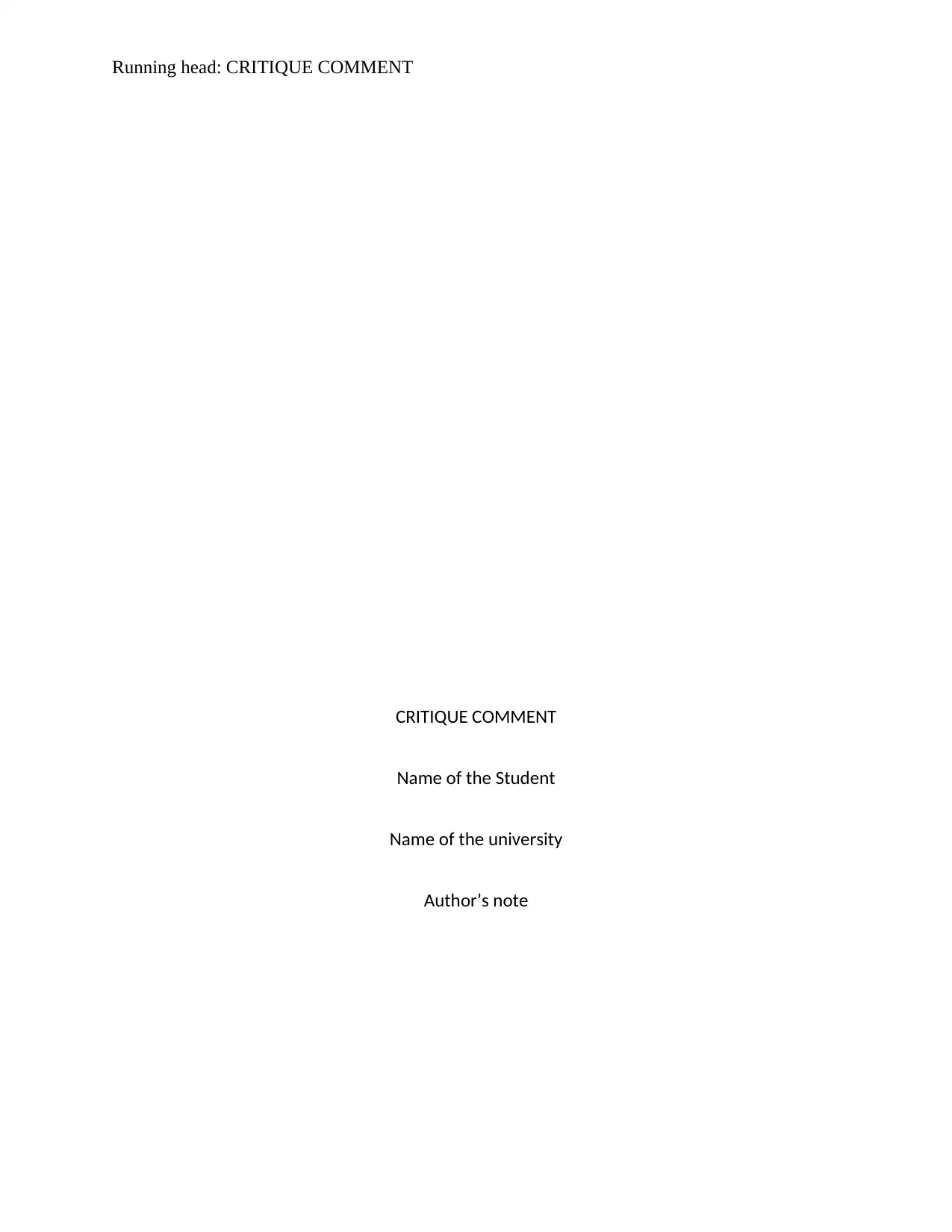
Running head: CRITIQUE COMMENT
CRITIQUE COMMENT
Name of the Student
Name of the university
Author’s note
CRITIQUE COMMENT
Name of the Student
Name of the university
Author’s note
Paraphrase This Document
Need a fresh take? Get an instant paraphrase of this document with our AI Paraphraser
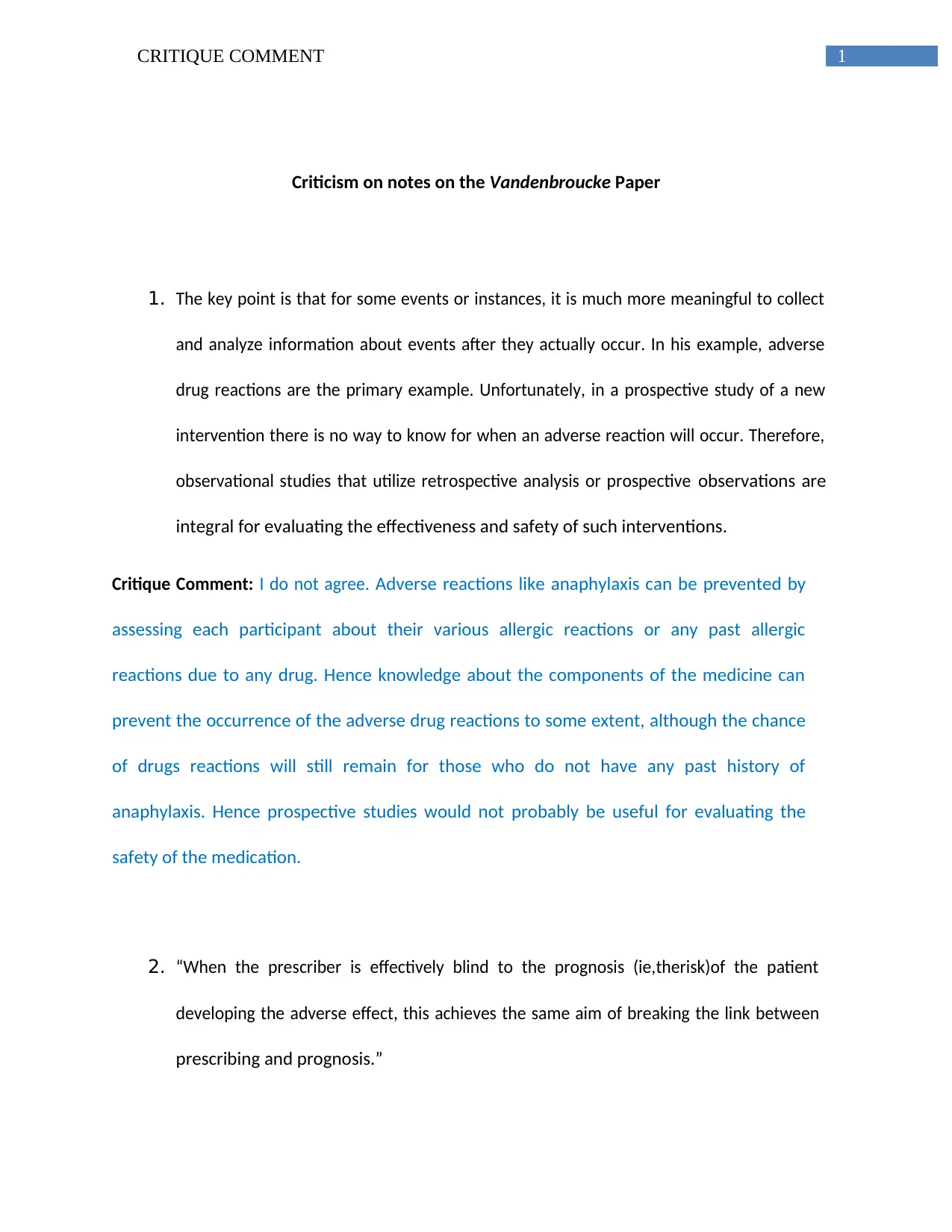
1CRITIQUE COMMENT
Criticism on notes on the Vandenbroucke Paper
1. The key point is that for some events or instances, it is much more meaningful to collect
and analyze information about events after they actually occur. In his example, adverse
drug reactions are the primary example. Unfortunately, in a prospective study of a new
intervention there is no way to know for when an adverse reaction will occur. Therefore,
observational studies that utilize retrospective analysis or prospective observations are
integral for evaluating the effectiveness and safety of such interventions.
Critique Comment: I do not agree. Adverse reactions like anaphylaxis can be prevented by
assessing each participant about their various allergic reactions or any past allergic
reactions due to any drug. Hence knowledge about the components of the medicine can
prevent the occurrence of the adverse drug reactions to some extent, although the chance
of drugs reactions will still remain for those who do not have any past history of
anaphylaxis. Hence prospective studies would not probably be useful for evaluating the
safety of the medication.
2. “When the prescriber is effectively blind to the prognosis (ie,therisk)of the patient
developing the adverse effect, this achieves the same aim of breaking the link between
prescribing and prognosis.”
Criticism on notes on the Vandenbroucke Paper
1. The key point is that for some events or instances, it is much more meaningful to collect
and analyze information about events after they actually occur. In his example, adverse
drug reactions are the primary example. Unfortunately, in a prospective study of a new
intervention there is no way to know for when an adverse reaction will occur. Therefore,
observational studies that utilize retrospective analysis or prospective observations are
integral for evaluating the effectiveness and safety of such interventions.
Critique Comment: I do not agree. Adverse reactions like anaphylaxis can be prevented by
assessing each participant about their various allergic reactions or any past allergic
reactions due to any drug. Hence knowledge about the components of the medicine can
prevent the occurrence of the adverse drug reactions to some extent, although the chance
of drugs reactions will still remain for those who do not have any past history of
anaphylaxis. Hence prospective studies would not probably be useful for evaluating the
safety of the medication.
2. “When the prescriber is effectively blind to the prognosis (ie,therisk)of the patient
developing the adverse effect, this achieves the same aim of breaking the link between
prescribing and prognosis.”
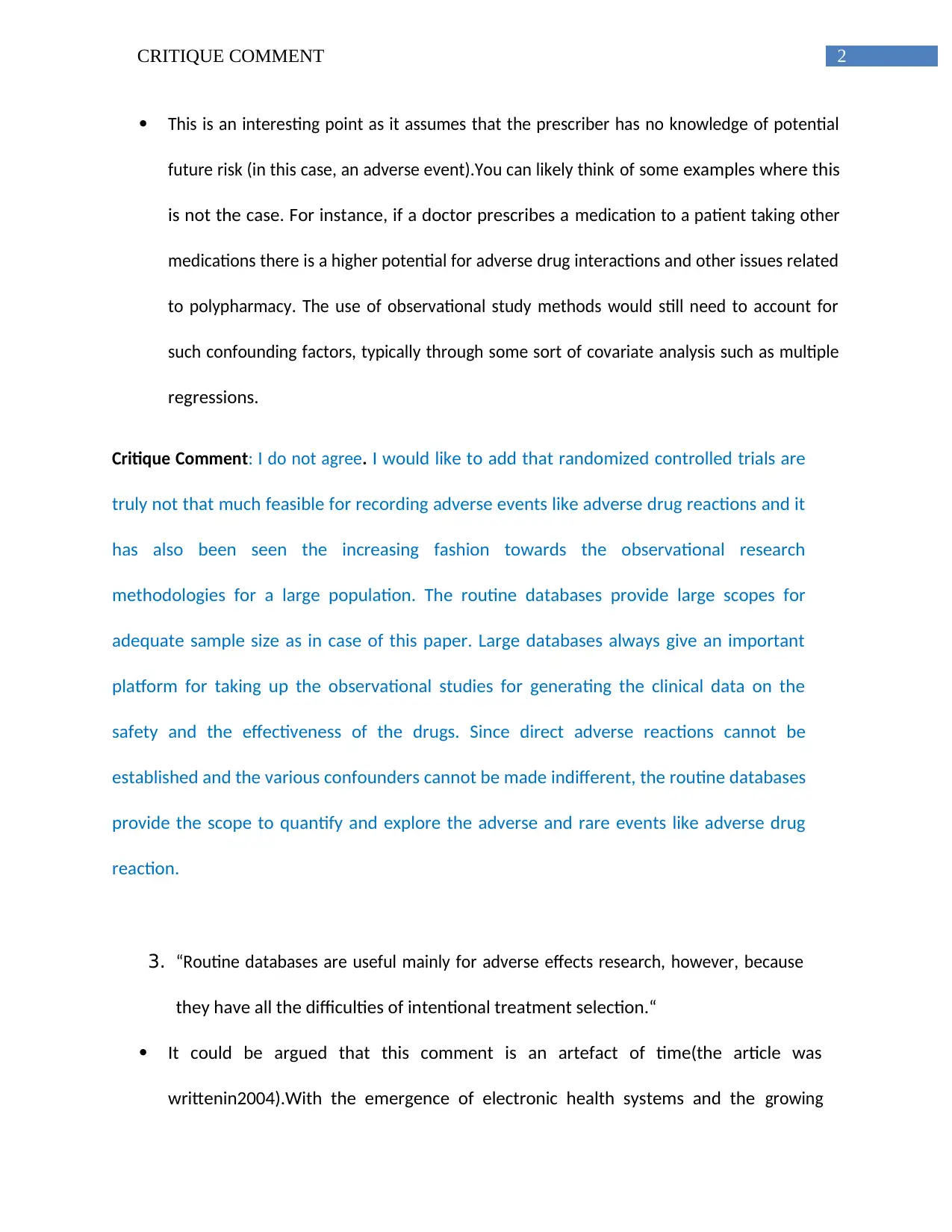
2CRITIQUE COMMENT
This is an interesting point as it assumes that the prescriber has no knowledge of potential
future risk (in this case, an adverse event).You can likely think of some examples where this
is not the case. For instance, if a doctor prescribes a medication to a patient taking other
medications there is a higher potential for adverse drug interactions and other issues related
to polypharmacy. The use of observational study methods would still need to account for
such confounding factors, typically through some sort of covariate analysis such as multiple
regressions.
Critique Comment: I do not agree. I would like to add that randomized controlled trials are
truly not that much feasible for recording adverse events like adverse drug reactions and it
has also been seen the increasing fashion towards the observational research
methodologies for a large population. The routine databases provide large scopes for
adequate sample size as in case of this paper. Large databases always give an important
platform for taking up the observational studies for generating the clinical data on the
safety and the effectiveness of the drugs. Since direct adverse reactions cannot be
established and the various confounders cannot be made indifferent, the routine databases
provide the scope to quantify and explore the adverse and rare events like adverse drug
reaction.
3. “Routine databases are useful mainly for adverse effects research, however, because
they have all the difficulties of intentional treatment selection.“
It could be argued that this comment is an artefact of time(the article was
writtenin2004).With the emergence of electronic health systems and the growing
This is an interesting point as it assumes that the prescriber has no knowledge of potential
future risk (in this case, an adverse event).You can likely think of some examples where this
is not the case. For instance, if a doctor prescribes a medication to a patient taking other
medications there is a higher potential for adverse drug interactions and other issues related
to polypharmacy. The use of observational study methods would still need to account for
such confounding factors, typically through some sort of covariate analysis such as multiple
regressions.
Critique Comment: I do not agree. I would like to add that randomized controlled trials are
truly not that much feasible for recording adverse events like adverse drug reactions and it
has also been seen the increasing fashion towards the observational research
methodologies for a large population. The routine databases provide large scopes for
adequate sample size as in case of this paper. Large databases always give an important
platform for taking up the observational studies for generating the clinical data on the
safety and the effectiveness of the drugs. Since direct adverse reactions cannot be
established and the various confounders cannot be made indifferent, the routine databases
provide the scope to quantify and explore the adverse and rare events like adverse drug
reaction.
3. “Routine databases are useful mainly for adverse effects research, however, because
they have all the difficulties of intentional treatment selection.“
It could be argued that this comment is an artefact of time(the article was
writtenin2004).With the emergence of electronic health systems and the growing
⊘ This is a preview!⊘
Do you want full access?
Subscribe today to unlock all pages.

Trusted by 1+ million students worldwide
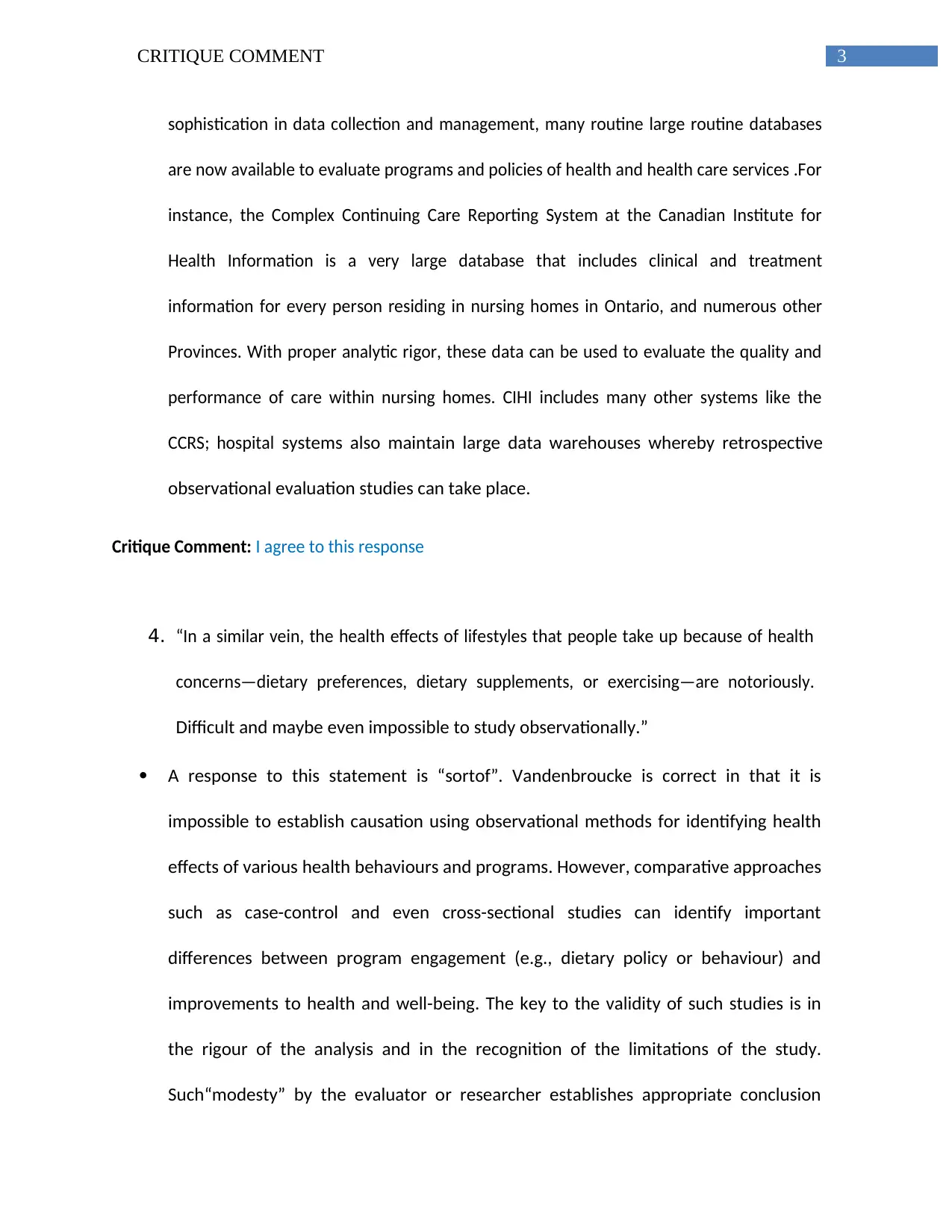
3CRITIQUE COMMENT
sophistication in data collection and management, many routine large routine databases
are now available to evaluate programs and policies of health and health care services .For
instance, the Complex Continuing Care Reporting System at the Canadian Institute for
Health Information is a very large database that includes clinical and treatment
information for every person residing in nursing homes in Ontario, and numerous other
Provinces. With proper analytic rigor, these data can be used to evaluate the quality and
performance of care within nursing homes. CIHI includes many other systems like the
CCRS; hospital systems also maintain large data warehouses whereby retrospective
observational evaluation studies can take place.
Critique Comment: I agree to this response
4. “In a similar vein, the health effects of lifestyles that people take up because of health
concerns—dietary preferences, dietary supplements, or exercising—are notoriously.
Difficult and maybe even impossible to study observationally.”
A response to this statement is “sortof”. Vandenbroucke is correct in that it is
impossible to establish causation using observational methods for identifying health
effects of various health behaviours and programs. However, comparative approaches
such as case-control and even cross-sectional studies can identify important
differences between program engagement (e.g., dietary policy or behaviour) and
improvements to health and well-being. The key to the validity of such studies is in
the rigour of the analysis and in the recognition of the limitations of the study.
Such“modesty” by the evaluator or researcher establishes appropriate conclusion
sophistication in data collection and management, many routine large routine databases
are now available to evaluate programs and policies of health and health care services .For
instance, the Complex Continuing Care Reporting System at the Canadian Institute for
Health Information is a very large database that includes clinical and treatment
information for every person residing in nursing homes in Ontario, and numerous other
Provinces. With proper analytic rigor, these data can be used to evaluate the quality and
performance of care within nursing homes. CIHI includes many other systems like the
CCRS; hospital systems also maintain large data warehouses whereby retrospective
observational evaluation studies can take place.
Critique Comment: I agree to this response
4. “In a similar vein, the health effects of lifestyles that people take up because of health
concerns—dietary preferences, dietary supplements, or exercising—are notoriously.
Difficult and maybe even impossible to study observationally.”
A response to this statement is “sortof”. Vandenbroucke is correct in that it is
impossible to establish causation using observational methods for identifying health
effects of various health behaviours and programs. However, comparative approaches
such as case-control and even cross-sectional studies can identify important
differences between program engagement (e.g., dietary policy or behaviour) and
improvements to health and well-being. The key to the validity of such studies is in
the rigour of the analysis and in the recognition of the limitations of the study.
Such“modesty” by the evaluator or researcher establishes appropriate conclusion
Paraphrase This Document
Need a fresh take? Get an instant paraphrase of this document with our AI Paraphraser
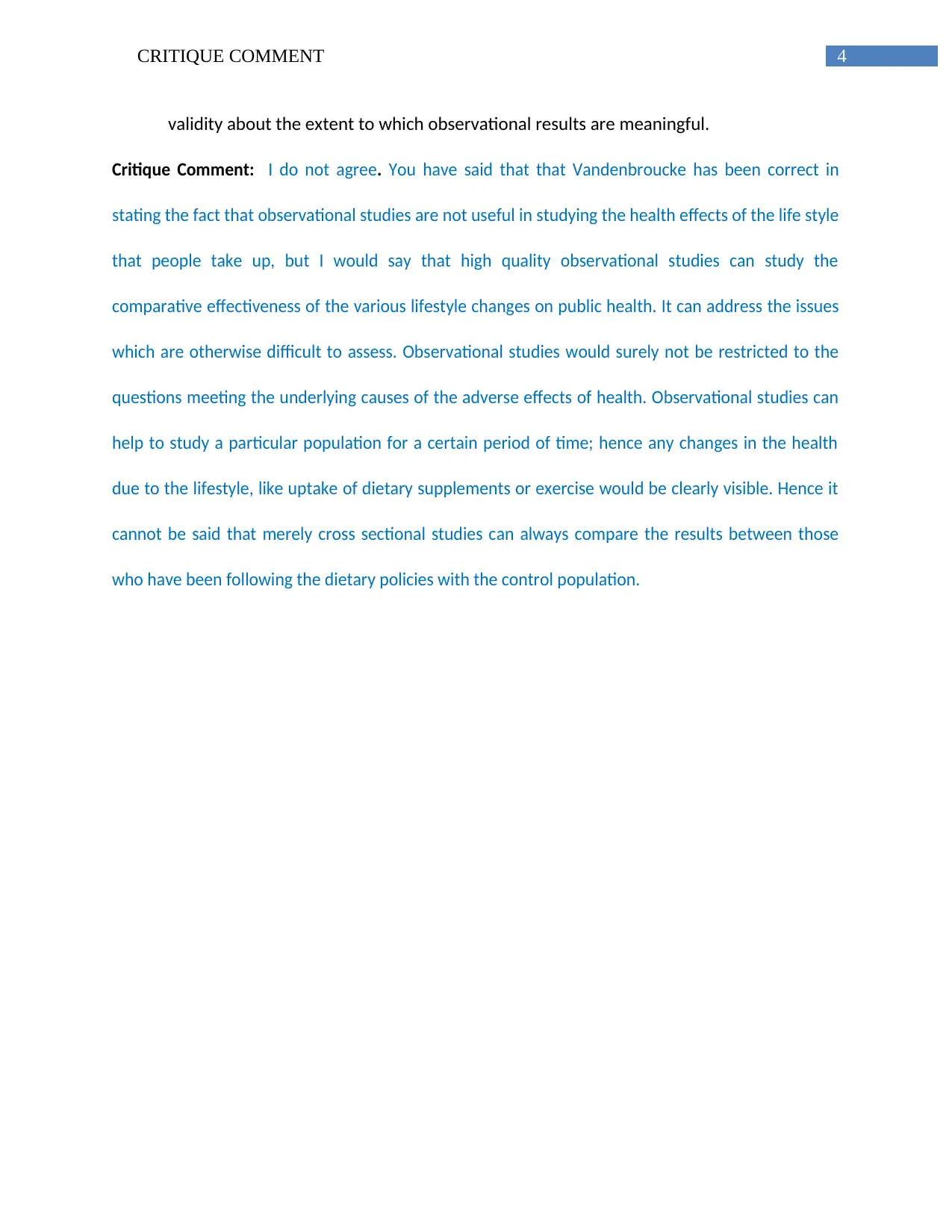
4CRITIQUE COMMENT
validity about the extent to which observational results are meaningful.
Critique Comment: I do not agree. You have said that that Vandenbroucke has been correct in
stating the fact that observational studies are not useful in studying the health effects of the life style
that people take up, but I would say that high quality observational studies can study the
comparative effectiveness of the various lifestyle changes on public health. It can address the issues
which are otherwise difficult to assess. Observational studies would surely not be restricted to the
questions meeting the underlying causes of the adverse effects of health. Observational studies can
help to study a particular population for a certain period of time; hence any changes in the health
due to the lifestyle, like uptake of dietary supplements or exercise would be clearly visible. Hence it
cannot be said that merely cross sectional studies can always compare the results between those
who have been following the dietary policies with the control population.
validity about the extent to which observational results are meaningful.
Critique Comment: I do not agree. You have said that that Vandenbroucke has been correct in
stating the fact that observational studies are not useful in studying the health effects of the life style
that people take up, but I would say that high quality observational studies can study the
comparative effectiveness of the various lifestyle changes on public health. It can address the issues
which are otherwise difficult to assess. Observational studies would surely not be restricted to the
questions meeting the underlying causes of the adverse effects of health. Observational studies can
help to study a particular population for a certain period of time; hence any changes in the health
due to the lifestyle, like uptake of dietary supplements or exercise would be clearly visible. Hence it
cannot be said that merely cross sectional studies can always compare the results between those
who have been following the dietary policies with the control population.
1 out of 5
Your All-in-One AI-Powered Toolkit for Academic Success.
+13062052269
info@desklib.com
Available 24*7 on WhatsApp / Email
![[object Object]](/_next/static/media/star-bottom.7253800d.svg)
Unlock your academic potential
Copyright © 2020–2025 A2Z Services. All Rights Reserved. Developed and managed by ZUCOL.
